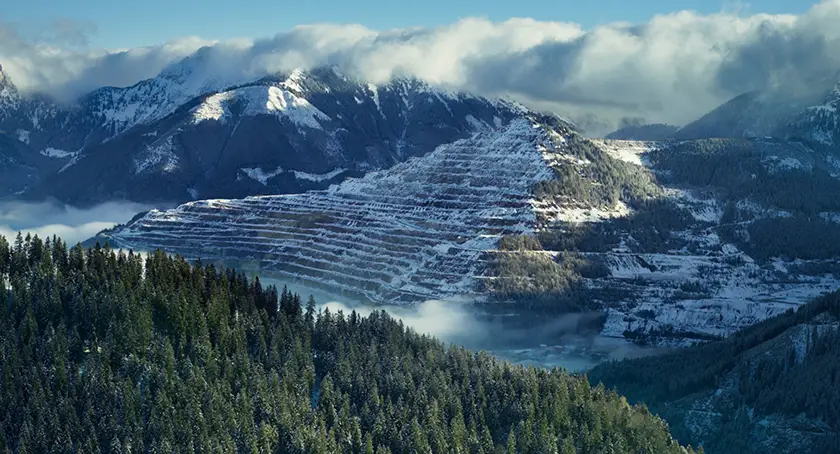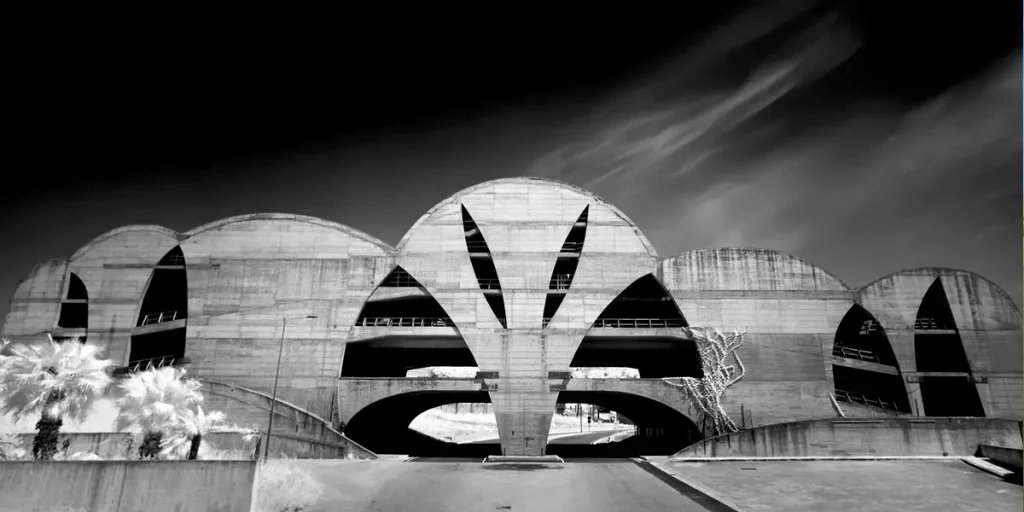Architecton is one of the best documentaries to portray and discuss humanity’s place within the natural world since 1982’s groundbreaking Koyaanisqatsi.
Writer and Director: Viktor Kossakovsky
Genre: Documentary
Run Time: 98′
Berlin Film Festival Screening: February 19, 2024
U.K. Release: January 10, 2025
U.S. Release: August 1, 2025
Where to watch: In theaters
Viktor Kossakovsky’s (Gunda) latest documentary, Architecton, is a poetic, dramatic and fascinating meditation on architecture that feels boundless in its reach and urges us to consider how we treat the natural world. It has the same urgency as his previous film, Gunda, but where that film was minimalist in detail and quite conventional, Architecton challenges our preconceptions of how the documentary form and visuals can be used to portray messages. If you think learning about rocks, concrete and stone might be boring, think again and give yourself to this colossal documentary.
Architecton begins with a montage of sweeping airborne shots capturing destroyed buildings. It is unclear which country it is or how they were reduced to rubble, but the devastation is the key here. Music from Evgueni Galperine’s (The Last Queen) album “Theory of Becoming” is a constant throughout the film and is vital in its opening to establish the core themes. Deep drones reverberate as if conjured from the ground itself, wavering brass notes hint at the fragility of our world, and melancholic tones reflect the possibility of all of this ending if we don’t change our ways.
After this enticing opening, Architecton follows Italian architect Michele De Lucchi as he explores some Byzantine ruins. Throughout the film, we see De Lucchi and two other men building a simple circle in his garden, the rim composed of rocks. Interspersed between these more conventional scenes are innovative shots of the world. From the avalanche of rocks down a cliff face to the awe-inspiring ruins of ancient civilisations, Architecton is consistently compelling and visually arresting in its imagery. Ben Bernhard’s (All That Breathes) cinematography and Alexander Dudarev’s (Gunda) sound design maximise our experience. Kossakovsky even finds time for humour, such as showing small rocks on a conveyor belt almost dancing in time to Galperine’s music.

Architecton begins with a quote from the late Italian poet Giovanni Pascoli about there being something new and ancient within the sun. It’s a contradiction that feeds into Kossakovsky’s way of thinking. Rocks and stone from centuries ago feel like they’re being discovered anew, whilst ancient cities’ now ruinous standing highlights the precarious existence of civilisations throughout history, with our present no different. We witness the beauty of humanity’s ability to create alongside its utter destruction. Most of all, Architecton is about concrete, and how our use of such a resource will only continue to stunt and harm the natural world. As De Lucchi posits at one point, the architect’s job is not just to build, but to influence how humans behave too.
Architecton is carefully considered in how it portrays these themes. The pacing is slow but it’s always engaging, especially when Kossakovsky opts for more abstract means of highlighting the urgent state of our existence. Godfrey Reggio’s Koyaanisqatsi released just over forty years ago, but its stunning juxtaposition of the manmade and natural worlds still rings true, feeding into Architecton. Its full title includes the words “Life Out of Balance”; in Architecton, this same conclusion is drawn, and with it the same pleading urgency for humans to change their ways of thinking and acting.
Architecton premiered at the 2024 Berlin Film Festival and was released in cinemas in the UK and Ireland on January 10, 2025. The film will open in US theaters on August 1, 2025.

